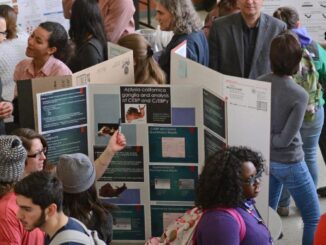
By Daniela Tovar-Miranda
Dr. Paul Coe is a math professor at Dominican who has conducted research on popular game shows including “Friend or Foe,” “The Price is Right,” “The Weakest Link” and most recently “Family Feud.”
“Family Feud” is a well-known game show in which families compete to guess popular survey answers in order to win points. The family with the most amount of points goes on to compete for a grand money prize. Coe’s research looks at the probability of winning if a family passes the question to the other family or if they chose to play.
So far Coe has watched 50 episodes to collect data on theoretical probability and plans to watch about 50 more to collect an adequate sample size. While collecting data, he has determined that most families prefer to play rather than to pass and has observed that if there are less answers on the board it will be easier to clear the board than if there are more top answers.
“Playing, people win about 55% of the time. So it’s just a little better to play than to pass but I have seen a few cases where one family could tell that the family that they are playing against wasn’t as sharp and would pass on purpose and made it work for them,” said Coe. It surprised him to see that natural strategy worked better than what he expected.
The research on “The Price is Right” has been based on both stage games that are played and on the Showcase Showdown, which is when three contestants spin a wheel to try to get as close to a dollar without going over. This data was a more mechanical process where less episodes had to be watched because there was more math calculated as compared to the data that is being collected for “Family Feud,” which is based on percentages of human behavior.
Theoretical probability and human behavior are both different calculations that are used differently to draw conclusions. “I enjoy doing the actual calculations, I was trained to classically do calculations, so I am pleased that I can use calculations to come to some meaningful conclusions.”
Coe has even been interviewed in 2002 for both the British Broadcasting Corporation (BBC) News and New Scientist for the research he conducted on “The Weakest Link.” The game first aired in the United Kingdom in 2000 and has contestants answer questions for prize money. At the end of each round the contestants vote off a contestant who they believe to be the weakest.
Coe got his Ph.D. in statistics and wrote his original dissertation on clinical trials and applied topics. He became interested in game show research when he determined that he can apply theoretical statistics to determine outcomes. He has published work on card shuffling strategies as well. He will be teaching Introduction To Calculus, Probability And Stats I and Applied Statistical Analysis SAS in fall 2021.
Coe has done research alongside Dominican economic professors Peter Alonzi and Daniel Condon, and DePaul University math Professor William Butterworth on game shows as well.


